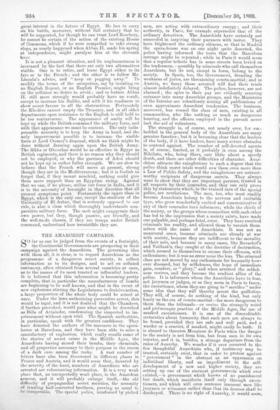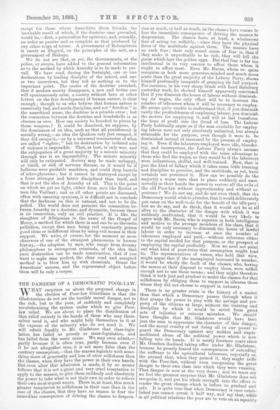THE ANARCHIST CAMPAIGN.
0 far as can be judged from the events of a fortnight, 10 the Continental Governments are prospering in their campaign against the Anarchists. The governing idea with them all, it is clear, is to regard Anarchism as the programme of a dangerous secret society, to collect information as to its .designs, and to act on collated testimony, often obtained from several countries at once, as to the names of its most trusted or influential leaders. It is believed that this information is becoming pretty complete, that in particular the manufacturers of bombs are beginning to be well known, and that in the event of new explosions stirring the Legislatures to decisive action, a large proportion of the whole body could be seized at once. Under the laws authorising preventive arrest, this would be legal, and it is not doubted that the Chambers, if further provoked, would pass what might be described as Bills of Attainder, condemning the suspected to im- prisonment without open trial. The Spanish authorities, in particular, speak with the greatest confidence. They have detected the authors of the massacre in the opera- louse at Barcelona, and they have been able to seize a manufactory of explosives, which really recalls some of the stories of secret crime in the Middle Ages, the Anarchists having stored their bombs, their chemicals, and all properties necessary to their purpose in the recess of a dark cave among the rocks. A vast number of letters have also been discovered in different places in France and Austria, and it would seem that, daunted by the severity of the hunt, numbers of Anarchists who are arrested are volunteering information. It is a very weak place that, an unexpectedly weak place, in the Anarchist armour, and it will probably enlarge itself,—the old difficulty of propagandist secret societies, the necessity of trusting half-converted brethren, proving as usual to be insuperable. The special police, reinforced by picked men, are acting with extraordinary energy ; and their authority, in Paris, for example supersedes that of the ordinary detectives. The Anarchists have certainly not succeeded in inspiring their pursuers with terror. They have frightened the ordinary citizens, so that in Madrid the opera-house was on one night quite deserted, the police having informed the town that the Barcelona outrage might be repeated ; while in Paris it would seem that a regular tribute has in some streets been levied on the tradesmen,—possibly by criminals who call themselves Anarchists, but do not, except in form, belong to the society. In Spain, too, the Government, dreading the weakness of juries, are threatening courts-martial; and in Austria, we fancy those arrested will find their trials almost indefinitely delayed. The police, however, are not alarmed ; the spies in their pay are evidently securing entrance into many Anarchist groups, and the Ministries of the Interior are relentlessly seizing all publications of even approximate Anarchist tendencies. The business, moreover, has roused the class of men, existing in all communities, who like nothing so much as dangerous hunting, and the officers employed in the pursuit never lack the aid of volunteers.
The struggle is, of course, not nearly over, for em- bedded in the general body of the Anarchists are many genuine fanatics ; but it is becoming clear that the leaders of the body, if it have leaders, have many severe obstacles to contend against. The number of self-devoted agents is, of course, limited, as it probably is even among the Nihilists, who, being Slays, care little about a speedy death, and there are other difficulties of character. Anar- chism attracts the vainglorious to such a degree that the police think secret trials would cow them even more than a Law of Public Safety, and the vainglorious are untrust- worthy recipients of dangerous secrets. They always want to show that they are important persons, trusted in all respects by their comrades, and they can only prove this by statements which, to the trained ears of the special police, are revelations. The men, too, who most readily become Anarchists belong to the nervous and excitable type, who grow wonderfully excited and communicative if any of their comrades turn informers ; while the chiefs of the society, or the groups whose connection with each other has led to the impression that a society exists, have made one palpable, and perhaps fatal, error. They have received criminals too readily, and allowed them to varnish them- selves with the name of Anarchists. It was not an unnatural error, because criminals are already at war with society, because they are indifferent to the morality of their acts, and because in many cases, like Ravachol's and Valliant's, they caught at the doctrine of destruction, which seemed to themselves to excuse their offences, with enthusiasm; but it was an error none the less. The criminal class are not moved by any enthusiasm for humanity how- ever diseased, but by selfishness, the hope of immediate gain, comfort, or " glory," and when arrested the selfish- ness revives, and they become the readiest allies of the police. It is informers whom the Anarchists have to fear, not jurymen or judges, or as they seem in Paris to fancy, the executioner, whom they are going to " sacrifice " under some idea that they will thereby arrest the guillotine. They will, of course, do nothing of the kind, but only hurry on the era of courts-martial—far more dangerous to them than the tribunals—or revive the strangely weird and picturesque practice of the Middle Ages, the use of masked executioners. It is one of the discreditable certainties about humanity that such men are always to be found, provided they are safe and well paid, and a warder or a convict, if masked, might easily be both. It is absurd to threaten Monsieur de Paris when the danger to the society is not from him, but from men in its own interior, and it is, besides, a strange departure from the rules of Anarchy. We wonder if it ever occurred to the -few thoughtful Anarchists who, if testimony may be trusted, certainly exist, that in order to protest against " government " in the abstract as an oppression on individual liberty, and an impediment to the self- development of a new and higher society, they are setting up one of the sternest governments which ever existed,—a government which knows of no punishment but death, which manifests itself only through execu- tioners, and which will even sentence innocent men like jurymen or witnesses rather than that its decrees shall be disobeyed. There is no right of Anarchy, it would seem, except for those whom Anarchists deem friends, the inevitable result of which, if the doctrine once prevailed, would be,—first, a persecution for opinions ; and, secondly, an order as passive and as complete as that produced by any other reign of terror. A government of Robespierres is surely as illogical, on the principles of the sect, as a government of Bishops. We do not see that, as yet, the Governments, or the police, or events, have added to the general information as to the method by which Anarchy is to be made to pre- vail, We have read, during the fortnight, one or two declarations by leading disciples of the school, and one or two interviews, but they tell us nothing as to the important point. The centre of the doctrine preached, that if modern society disappears, a new and better one will spontaneously arise, a society without laws or other fetters on the free development of human nature, is clear enough ; though to us who believe that human nature is essentially bad, and needs discipline, and not " freedom " iu the anarchical sense, the doctrine is a pitiable error ; but the connection between the doctrine and bombshells is as obscure as ever. How can society be knocked to pieces by those weapons ? It could be dissolved, we suppose, by the dominance of an idea, such as that all .punishment is morally wrong,—an idea the Quakers only just escaped, if they did escape it,—or by a universal renunciation of what are called " rights ; " but its destruction by isolated acts of violence is impossible. That, at best, is only war, and the subjugation of a great majority by a minute minority through war is an impossibility. The minute minority will only be extirpated. Society may be made unhappy, or timid, or sick of nervous disease, as it would be if balloons were guidable machines, and could drop barrels of nitro-glycerine ; but it cannot be destroyed except by a force stronger and better disciplined than itself, and that is not the idea of Anarchy at all. This is the point on which we get no light, either from men like Reclus or men like Valliant; and as all other points are discussed, often with amazing cynicism, it is difficult not to conclude that the darkness on this is natural, and not to be dis- pelled. The world does not perceive the connection be- tween Anarchy as a doctrine, and dynamite, because there is no connection, only an evil practice. It is like the slaughter of Albigenses in the name of the Gospel of Mercy, a method for which there is and can be no theoretic palliation, except that men being evil constantly poison good ideas or indifferent ideas by using evil means in their support. We write, of course, for the moment as mere observers of one of the strangest phenomena in human history,—the adoption by men, who range from dreamy philosophers to outrageous criminals, of the idea that pure destruction can be made constructive, that if you want to nigke man perfect, the clear road and accepted method is to blow him up with chemicals. Grant the Anarchists' success, and the regenerated object before them will be only a corpse.



































 Previous page
Previous page